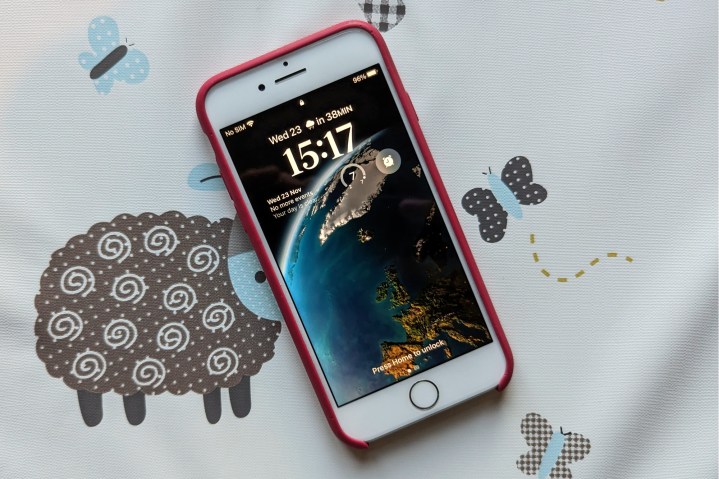When the iOS 16 compatibility list was announced, it was a cause of celebration. Sure, the iPhone 7 and earlier were out of the running, but that still meant the iPhone 8 was in line for the new update. The five-year-old iPhone is now the oldest iPhone to be updated to the newest, shiniest version of iOS, and since that’s the iPhone I own, that has to be a cause for celebration. Right?
Right?
Like many, I am apprehensive of software updates, especially where older devices are concerned. The next update after a phone’s release? I hit the Update button with the force of a thousand suns. The second? Hmm, a little bit worried, but I’m sure it’ll be fine. The fifth, though? New software clashing with aging hardware is surely going to be a recipe for disaster. My iPhone 8 isn’t just a backup smartphone, it’s also the iPhone I use for work, so it’s a pretty vital device, and I didn’t want to see it slow down — or worse.
So, when I pressed Download and install, I did it with more than a little trepidation. But was I right to be worried?
What we all fear about operating system updates

My fears stem from the anecdotes we’ve all heard: “I downloaded a new update, and now my battery life is terrible,” “My phone is now really slow,” or even, “It’s broken my phone.” Operating system updates add new features, but there’s a strong feeling amongst many that they can also slow your phone and reduce its battery life. This conspiratorial thinking often leans toward companies using planned obsolescence, intentional sabotage that hastens the purchase of a new device by slowing down or otherwise reducing the usability of your current device.
These conspiracy theories actually bore fruit in 2017 when it was revealed Apple was slowing down older iPhones with new software updates. The company claimed it was doing so to stop unexpected shutdowns stemming from aging batteries. But regardless of the truth of the matter, people were enraged. Much of the anger seemed to come from this practice being hidden from consumers at large. After all, a slow smartphone is infuriating, and while Apple started an extended free battery replacement service on the back of this outrage, the damage was done.
Thankfully, this was largely an isolated incident, and there’s precious little other evidence of manufacturers intentionally slowing down other smartphones. After the impact on Apple’s reputation, it’s also unlikely it would consider doing anything like this again. But these rumors come from somewhere, and it’s likely you have noticed a beloved device slowing down after a large update.
In reality, any slowdown is likely to be a combination of aging hardware struggling to run more demanding software, as well as a touch of simple confirmation bias. You can help stave some of this off by replacing key components, like the battery, but you eventually have to accept your device will slow down over time.
How my iPhone 8 runs iOS 16

Knowing this didn’t help the anxiety of watching my venerable iPhone 8 download and then install iOS 16. Preparing myself for the worst, I watched it boot back up, and …
Er, well, it was fine, actually. In fact, it felt largely the same as it had before the update. It was no slower than when it ran iOS 15, and using it like I normally do felt exactly the same. The new features were fun and useful, and they didn’t hinder the day-to-day running of the device. The standout feature was the new lock screen, which I immediately made changes to. Oddly, battery life, which I had actually expected to take a hit, was also fine.
All in all, not a bad update, really.
Apple really is the king of mobile updates

It was a shocking result, but should I have been shocked, really? Apple is easily the most accomplished mobile manufacturer at keeping old devices up to date. It only cut off the iPhone 6S — a device released in 2015 — after a full seven years of updates. When you consider most manufacturers dip out after three years at maximum, Apple’s record is nothing short of incredible.
But a long update tail doesn’t mean the updates are always going to be of high quality. Not every update is guaranteed to be as well-rounded as iOS 16 has turned out to be, and you should always be a little cautious when installing a new major update. That’s why we always recommend backing up your iPhone before every major update, as well as every now and again, just to be sure.
But even with all those portents of doom ringing in your ears, can we take a moment to really appreciate what an amazing job Apple has done here? Not only is it continuing to update a phone years after other manufacturers would have thrown in the towel, it’s done so with a flourish. I’ve used five-year-old smartphones before, and they don’t compare to the pleasant experience I get from using the iPhone 8 in 2022.
So yes, while there’s still healthy anxiety to be had where updates and old phones are concerned, Apple is continuing to buck those trends and deliver incredible upgrades, year after year. Roll on, iOS 17. My iPhone 8 will be ready.
Editors’ Recommendations

